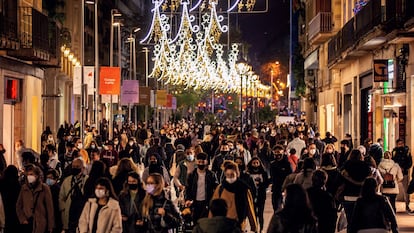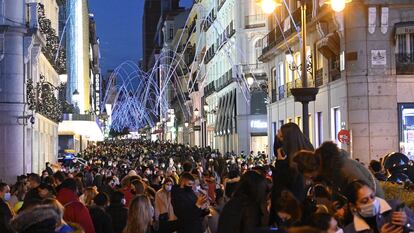Coronavirus tests and self-isolation beforehand: What the experts say about reducing the risks if returning home for Christmas
Sources consulted by EL PAÍS agree that family meetings should be kept to a minimum, but thousands of Spaniards are still planning to travel to see relatives over the festive season. Here are some of the recommendations for how to do so as safely as possible

After giving it a lot of thought, Sonia has decided what to do this Christmas. She lives in Barcelona and will return home to Marbella to see her 70-year father, who has heart problems. Sonia will take extra precautions before making the trip: she will spend a week in isolation, without going to the office or meeting up with friends. And a day before leaving, she will use her private health insurance to get a PCR test, which will give her results within hours. “Even so, I’m terrified,” the 39-year-old admits. She knows that a negative test result is no guarantee she won’t spread the virus. She has to catch an airplane to Marbella, and while only a scant number of contagions have been documented on planes, there have been some cases. Once at home, she will follow all the preventive measures recommended by health authorities.
Sonia is one of the thousands of Spaniards who will travel to see their loved ones over Christmas and are planning how to do it in the safest way possible. The best way to prevent the risk of a third wave of the pandemic would be to skip Christmas celebrations this year altogether – for the public to remain alert, without exceptions and without gathering with members of different households. In this scenario, the perimetral lockdowns currently in place in several regions would remain over the festive season and the nighttime curfew would not be pushed back to a later time. The central and regional governments are expected to announce general recommendations for the Christmas holidays this week, but based on what has been discussed so far, it is fairly clear that this is not going to happen.
It’s very good for people to reduce social interactions as much as possible 10 to 14 days before gathering, but not everyone canAndrea Burón, the spokesperson of the Spanish Public Health Society
In lieu of these restrictions, the message from almost all public health experts is: “Try to avoid dinners and lunches with people from different households, or reduce them to a minimum; if you want to see your family, do not meet around a table, but rather outdoors.” But it is unclear how effective this message will be if it is not accompanied by additional advice for the thousands of families who will travel over the Christmas period. There are more and less safe ways to make this trip: returning home after being in self-isolation for a few days is not the same as doing so after seeing lots of different people, or with or without a test.
Spanish authorities have yet to take a clear stand on the question of tests. The conservative Popular Party (PP) said in Parliament that PCR tests should be carried out on everyone who is returning home for Christmas. But no PP regional government has yet introduced the measure. In the Canary Islands, which has the lowest incidence rate in Spain, regional authorities are planning protocols to carry out tests on residents who return home for Christmas. And the Balearic Islands, the region with the second-best figures in Spain, will pay for voluntary tests for those who return from the mainland over the upcoming long weekend. It is also considering what to do in the lead-up to Christmas, reports Lucía Bohórquez.
In principle, the position of the central government is for tests to be targeted, not carried out in a general manner. Spain’s secretary of state for health, Silvia Calzón, explained in an interview with EL PAÍS that it was important for the public not to confuse tests with treatment. Last week, the Health Ministry sent the regions a draft document with proposed coronavirus restrictions for Christmas. The email – which was soon leaked to the press – said that the government was not considering carrying out PCR tests on university students returning home due to logistical complications. But the issue will be considered by the Inter-Territorial Council of the National Health System, which brings together central and regional health chiefs, when it meets on Wednesday to discuss common guidelines for the Christmas period.
Health experts are also divided on the issue of tests. There is concern, for instance, that individuals who test negative will believe they do not pose any risk of spreading the virus. But this is not the case: the result may be a false negative and there is also the chance that a person may catch the virus while waiting for the PCR results – not everyone receives them on the same day. A lot also depends on the type of test that is taken. PCR tests are the most reliable, even in asymptomatic cases, but are logistically more complicated and test results take longer. Antigen tests are less expensive and provide results within 15 minutes, but are less reliable if the individual is not presenting coronavirus symptoms. “But it’s also true that these [asymptomatic] cases are less capable of transmitting [the virus],” says Ana María García, a professor of public health at Valencia University.
Most of the experts consulted agree that for people returning home over Christmas taking a test is better than doing nothing, as long as they are clear on its limitations
José Antonio López Guerrero, the head of the neurovirology department at Madrid’s Autonoma University, explains that fast tests that can be done at home are about to be approved. These tests would be similar to a PCR but would be able to give a result in 30 minutes. They would also use a less invasive way to collect a sample, rather than a swab placed deep into the nose. If these tests are approved in Spain between now and Christmas, López Guerrero believes taking one before a family gathering would be an acceptable option to reduce the risk of spreading the virus.
Most of the experts consulted (half-a-dozen epidemiologists and virologists) agree that for people returning home over Christmas taking a test is better than doing nothing, as long as they are clear on its limitations and continue to follow coronavirus safety measures: face masks, handwashing, social distancing, maximizing ventilation and outdoor activities, minimizing social contact and staying at home if experiencing symptoms or if a contact has tested positive.
Sonia’s plan to self-isolate and take a test before leaving to see her father is probably the most sensible strategy for those returning home over Christmas – but it has its limitations. “It’s very good for people to reduce as much as possible social interactions 10 to 14 days before gathering, but not everyone can,” explains Andrea Burón, the spokesperson of the Spanish Public Health Society. “It would be a good idea for companies to allow remote working wherever possible.”
Another problem with self-isolation, beyond whether or not a company allows home working, is faced by families with children. Quique Bassat, an epidemiologist and pediatrician at the ISGlobal health institute, says that the situation in Spain’s schools is “fairly controlled” thanks to effective protocols on notifying positive cases and quarantining classes. “But over Christmas, these children will be in contact with others, with less control, they will go to each other’s houses, to the homes of grandparents and neighbors, because their parents might be working, and we have to be especially careful when they come into contact with vulnerable people,” he says.
Danger of crowds
Silvia Calzón appealed on Monday for the public to act responsibly and show “common sense” after large crowds of Christmas shoppers thronged the streets of cities such as Madrid and Barcelona last weekend. The health official recommended citizens “avoid crowds” in the streets to prevent the coronavirus situation in the country from worsening. “This is not over,” she warned.

But Pedro Gullón, from the Spanish Epidemiology Society, says there is not much evidence about how the virus is transmitted outdoors. “There are different degrees. The scenes of crowds cause a lot of impact. It all depends on how many people there are, the safety measure and the length of exposure,” he says. “Although moments with lots of people were recorded, by being outside, with measures like face masks, and there being a short period of contact, because you are moving, there is no evidence of great risk. The problem is what accompanies it. If there are lots of people on Preciados street [in Madrid], this means that there are lots of people entering stores and if the limits on capacity are not respected, that could be more dangerous,” he adds. In the case of stores, the situation is distinct: they are enclosed spaces where objects are frequently touched and not always disinfected afterward, meaning there is a higher risk of transmission.
English version by Melissa Kitson.
Tu suscripción se está usando en otro dispositivo
¿Quieres añadir otro usuario a tu suscripción?
Si continúas leyendo en este dispositivo, no se podrá leer en el otro.
FlechaTu suscripción se está usando en otro dispositivo y solo puedes acceder a EL PAÍS desde un dispositivo a la vez.
Si quieres compartir tu cuenta, cambia tu suscripción a la modalidad Premium, así podrás añadir otro usuario. Cada uno accederá con su propia cuenta de email, lo que os permitirá personalizar vuestra experiencia en EL PAÍS.
¿Tienes una suscripción de empresa? Accede aquí para contratar más cuentas.
En el caso de no saber quién está usando tu cuenta, te recomendamos cambiar tu contraseña aquí.
Si decides continuar compartiendo tu cuenta, este mensaje se mostrará en tu dispositivo y en el de la otra persona que está usando tu cuenta de forma indefinida, afectando a tu experiencia de lectura. Puedes consultar aquí los términos y condiciones de la suscripción digital.









































